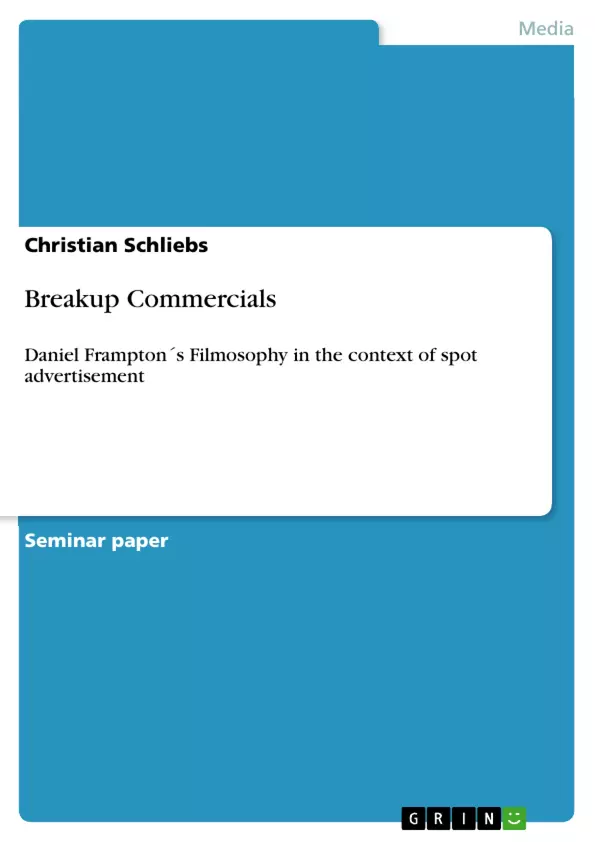With filmosophy, Daniel Frampton tries to establish a brand new way to encounter the phenomena of film experience. He claims that „borrowed“ theories like narrativity from literature don´t get close enough to, on the one hand how film connects with the individual filmgoer and on the other hand how reality is processed by the filmmakers into films.
Filmosophy offers multiple accessions to analyze the film experience. As it is labeled as a manifesto, the whole concept keeps an open form, which is in perpetual development. With this assignment I am trying to achieve three aims. Firstly I try to accept Frampton´s invitation to rethink the traditional way to think about film.
The second, less abstract, aim is to convey Frampton´s concept from feature films to spot advertisement. In this context I´m going to give a brief introduction to four specific categories Frampton established in his manifesto, namely „filmind“, „film-thinking“, „fluid images“ and „the filmgoer“. These categories will be, if needed, altered for the analysis of commercials.
In a second step I am going to apply these categories on the commercial „meinestadt.de - open city“. The third and final aim of this assignment is to evaluate the adaptability of Frampton´s manifesto for the commercial genre.
Inhaltsverzeichnis (Table of Contents)
- 1. Introduction
- 2. Filmosophy
- 2.1 Filmind & Film-thinking
- 2.2 Fluid Film-thinking
- 2.3 Filmgoer
- 3. Applied Filmosophy on the commercial "meinestadt.de - open city"
- 4. Resumé
Zielsetzung und Themenschwerpunkte (Objectives and Key Themes)
This assignment aims to reinterpret Daniel Frampton's filmosophy, initially applied to feature films, within the context of short commercials. It seeks to adapt Frampton's concepts – "filmind," "film-thinking," "fluid images," and "the filmgoer" – for analyzing advertisements. The assignment then applies these adapted concepts to the "meinestadt.de - open city" commercial and evaluates the effectiveness of Frampton's framework in this new context.
- Adapting Frampton's filmosophy to the analysis of commercials.
- Exploring the concepts of "filmind," "film-thinking," and "fluid film-thinking."
- Analyzing the "meinestadt.de - open city" commercial using Frampton's framework.
- Evaluating the applicability of filmosophy to the commercial genre.
- Comparing and contrasting traditional media studies approaches with Frampton's filmosophy.
Zusammenfassung der Kapitel (Chapter Summaries)
Chapter 1: Introduction introduces Frampton's filmosophy and its aim to provide a new approach to film analysis, moving beyond traditional narrative frameworks. The assignment outlines three objectives: to reinterpret Frampton's work, to apply his concepts to commercials, and to evaluate their adaptability. The author uses McLuhan's approach as a guiding principle.
Chapter 2: Filmosophy provides an overview of Frampton's theory, emphasizing its non-narrative focus and its goal to understand film as a form of "affective intelligence." Key concepts like "filmind" and "film-thinking" are introduced, along with the idea of "fluid film-thinking" as a dynamic process of world-creation within the film.
Chapter 2.1: Filmind and film-thinking defines these core concepts, explaining how "filmind" refers to the film's inherent being and "film-thinking" describes the film's process of presenting its world to the viewer. The chapter also discusses how these concepts can be applied to commercials.
Chapter 2.3: Fluid film-thinking explains how this aspect of filmosophy involves the manipulation and transformation of the film's world, highlighting its relevance for the dynamic and concise nature of commercials.
Schlüsselwörter (Keywords)
Filmosophy, Daniel Frampton, film analysis, commercial advertising, filmind, film-thinking, fluid film-thinking, "meinestadt.de - open city" commercial, narrative, media studies, affective intelligence, adaptation, manifesto.
Frequently Asked Questions
What is "Filmosophy" according to Daniel Frampton?
Filmosophy is a brand new way to encounter the phenomena of film experience, treating film as a form of "affective intelligence" rather than just a narrative medium.
What is the "filmind"?
The "filmind" refers to the film's inherent being or consciousness, which presents its world to the viewer through "film-thinking".
How can Filmosophy be applied to commercials?
The assignment adapts Frampton's categories like "fluid images" to analyze the concise and dynamic nature of spot advertisements.
Which specific commercial is analyzed in this work?
The author applies Filmosophy to the commercial "meinestadt.de - open city" to test the framework's adaptability.
What is "fluid film-thinking"?
It is a dynamic process of world-creation within a film, involving the manipulation and transformation of the film's reality.
Does Frampton use traditional literary theories for film?
No, Frampton claims that "borrowed" theories like narrativity from literature don't get close enough to the actual film experience.
- Quote paper
- Christian Schliebs (Author), 2009, Breakup Commercials, Munich, GRIN Verlag, https://www.grin.com/document/123362



